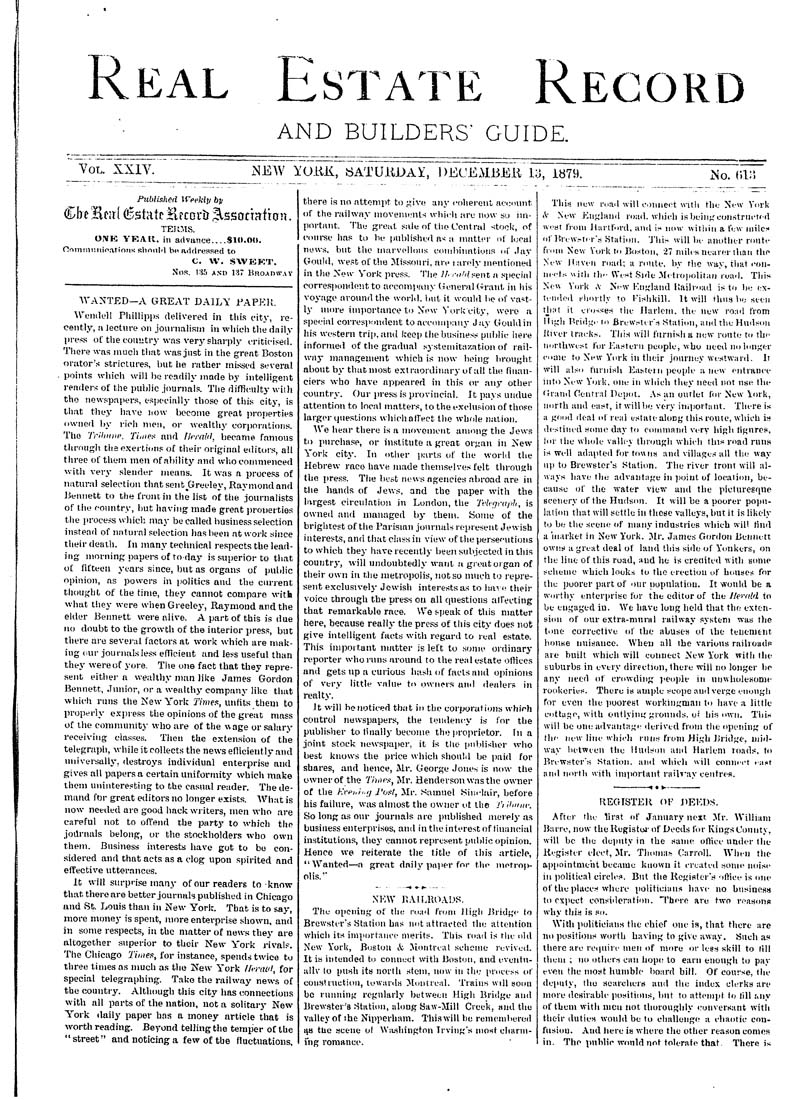Columbia University Libraries Digital Collections: The Real Estate Record
Use your browser's Print function to print these pages.
Real estate record and builders' guide: v. 24, no. 613: December 13, 1879

Text version:
Please note: this text may be incomplete. For more information about this OCR, view About OCR text.
Real Estate AND BUILDERS' GUIDE. ]ORD YoL. XXIY. NEW YUliK, 8ATUKJJAY, DECEMBEE Id, 1879. No. iiV.) PublLthed Weekly by Cbe Hm{ Estate Wtnoxh ^ssof mi ian. TERMS. OiVK YKAU. in advance... .SIO.OO. Oominiinif.alioris slinnlfl bKadriressed to C. \V. .SWKKT. No.s. 135 AND i;j7 BnOADW.VY WANTED—A GREAT DAILY I^APICII. Wendell Phillipps delivered in this city, re¬ cently, !i lecture on jouinalisni in which the daily press of the country was verj' sharply criticised. There was much tiuit %vas just in the great Boston orator's strictures, but he rather missed several points which will be readily made by intelligent renders of the public journals. The diffiiuilty wiih the newsp.ipers, especially those of this city, is that they Inivo now become great jiroperties owned by rich men, or wealthy corporations. Tho Tribune. Tinies and Herald, became famous through the exertions of their original editors, all three of them men of ability and wl.o commenced v.itb very slender means. It was a process of natural selection that seiitpreeley, Raymond and Bennett to the front in the list of the journalists of the country, but iiaviug made great jiroperties the proce.=;s which may be called business selection instead of natural selection has been at work since their death. In many technical res^pects the lead¬ ing morning papers of today is superior to that of fifteen years since, but as organs of public opinion, as powers in politics and the current thought of the time, thej' cannot compare witk what they were when Greeley, Raymond and the elder Bennett were alive. A part of this is due no doubt to the growth of the interior press, but there are several factors at work which are mak¬ ing our journals less efllcient and less useful than they were of yore. The one fact that they repre¬ sent either a wealthy man like Jaines Gordon Bennett, .Junior, or a wealthy company like that which runs the Kew York Times, unfits them to properiv e.xpie.ss the opinions of the great mass of the community who are of the %\age or salarj' receiving classes. Then the extension of the telegraph, while it collects the news efliciently and iiiiiversallj-, destroys individual enterprise nnd gives all papers a certain uniformity which make them uninteresting to the casual reader. The de¬ mand for great editors no longer exists. What is now needed are good hack writers, men who are careful not to ofl'end the partj' to which the jodrnals belong, or the stockholders %vho own them. Business interests have got to bo con¬ sidered and that acts as a clog upon spirited and effective utterances. It will surprise many of our readers to know that there are better journals published in Chicago and St. Louis than in New York. That is to .saj-, more money is spent, more enterprise shown, and in some respects, iu the matter of news they are altogether superior to their New York rivali^. The Chicago Times, for instance, spends twice to three times as much as tho New York llenwl, for special telegraphing. Take the railway news of the country. Although this city has connections with all parts of the nation, not a solitary New York daily paper has a money article that is worth reading. Beyond telling the temper of the "street" and noticing a few of the fluctuations. there is no attempt to give any coherent aecmint of the railwaj- movenn-nts which arc now su jni- portant. The great sale of tho Central stock, of course has to be published as a matter of l,jcal news, but the marvellous coiulnnatiuiis oi' ,Iav Gould, we.^t of tbe Missouri, aie ijirely inentioned in the New V'ork pre.ss. The i/- .-("''/sent a special correspondent to accoinjS. The opening of the ruad from Higli Bridge to Brewster's Station has not attracted the attention which its importance merits. This road is rhe old New York, Boston &. I\bnitreat scheme ixvived. Itis intended to conuccl with Boston, and eveiitu- allv to push its north stem, now in the pmcess ot construction, towanls ^Montreal. Trains will soon bo running regularlj' between High Bridge aud Bicw.stcr'8 Station, along Baw-Mill Creek, and the valley of ihe Nipperhain. This will be remembered lis the scene ot Wiushington Trving's most charui- iiig romance. This new road will oniiect with the New Vork .V New England road, whieh is beingconstructcd west from Hartford, and is now within a few miles nSlbewr-icr's Station. 'J'liis will be anotlier route fnun New Vork to Boston, 27 niilcH nearer than the Ni-w Haven road; a route, by rhe way, that con- iH'ds witb th'- West Side Metropolitan roa>l. This Ne« Vork ,V N<-w Knglaiid Uailroad is to be r.x- ttiided tbortly to Fishkill. It will thus be seen that il crosses the Ilarlem, the new road from High P.ridi in political circles. But the RegiRiei".s uflice is one of the places where politicians have no business to csjiect consi<1eration. There are two reasons why thia is ."o. With politiciaiKs the chief one is, that there are no positions worth having to give away. Such as there are recpiire men of more or less skill to till them ; no others can hope; to earn enough to pay evflti the most humble board bill. Of course, the deputy, the searchers and the index clerks are more desirable iiositions, but to attempt to till .M>y of them with men not thoioughly conversant with their duties would be to challenge a chaotic con¬ fusion. And here is where the other reason comes in. The pnblic wonld not tolerate that There is